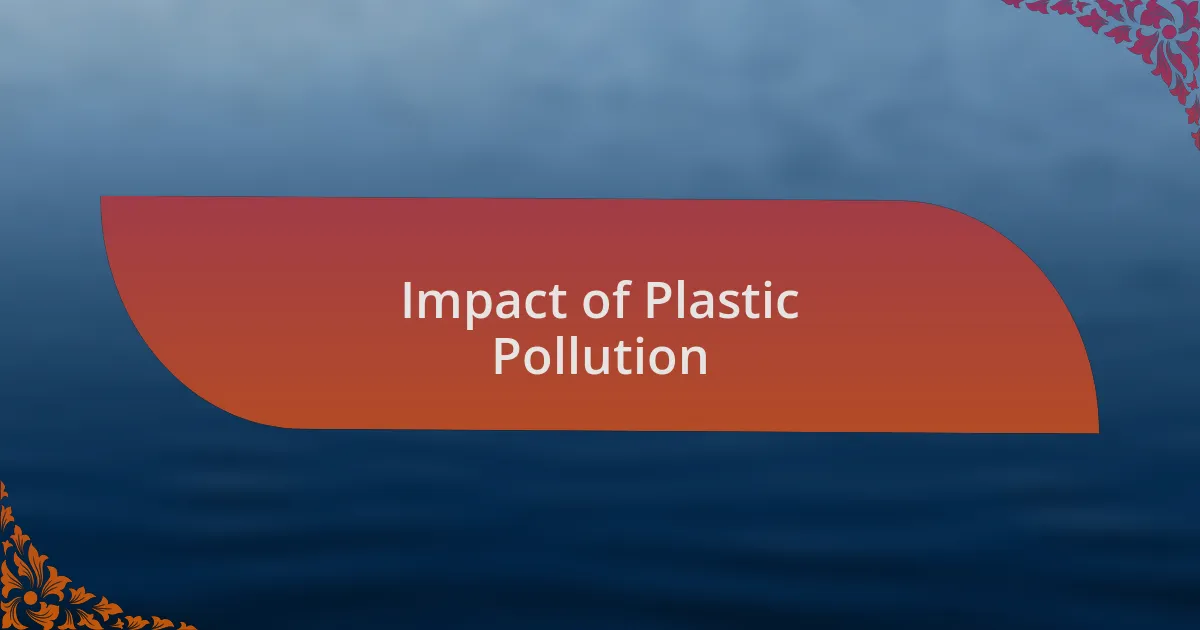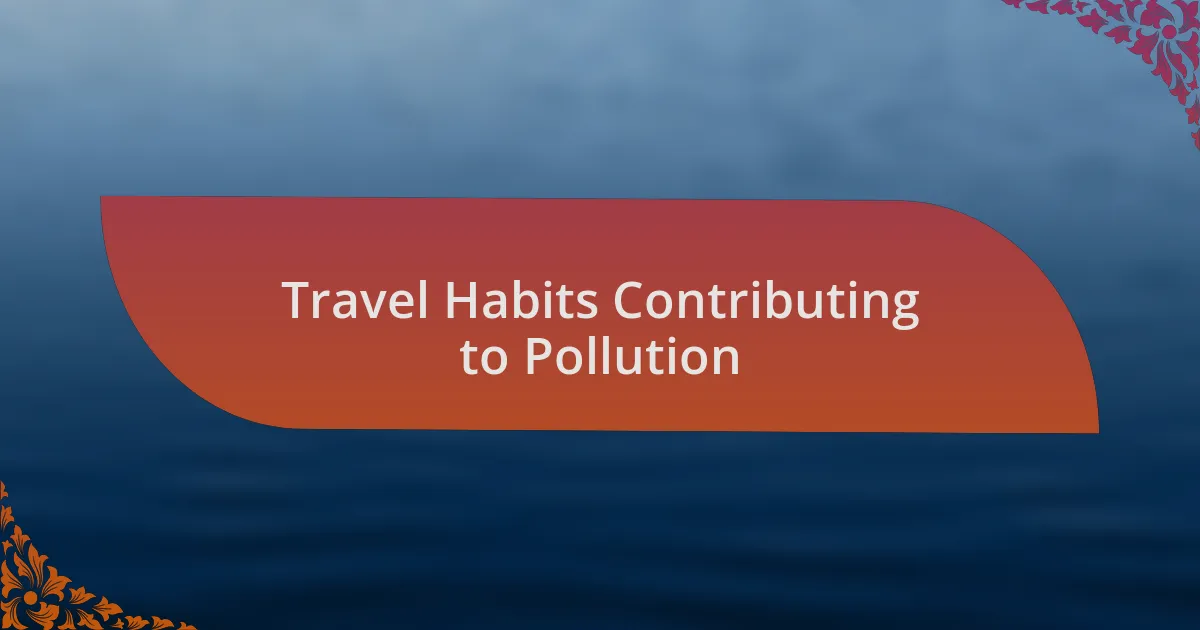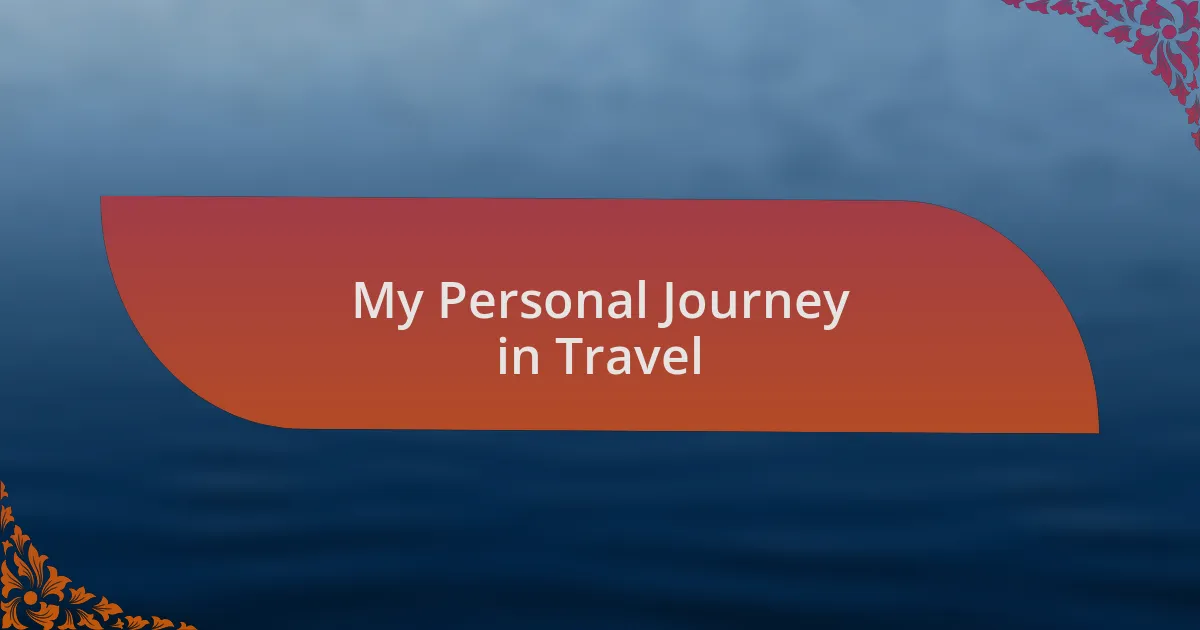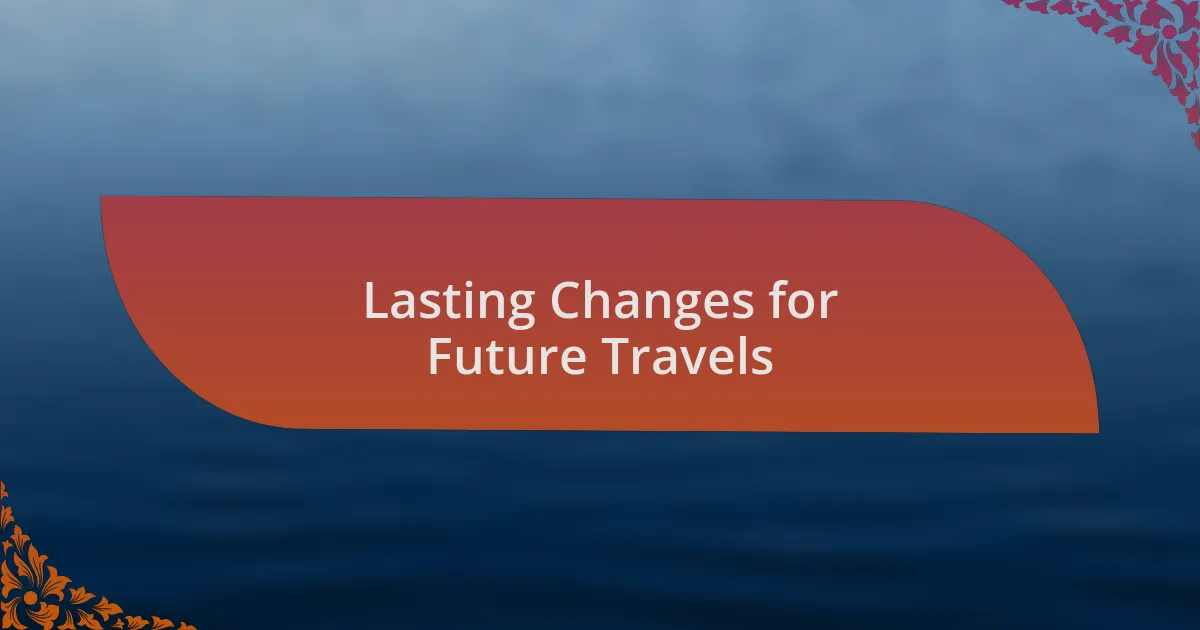Key takeaways:
- The oceans are crucial ecosystems that provide oxygen and regulate climate, emphasizing the need for conservation efforts.
- Plastic pollution severely affects marine life, disrupting food chains and leading to direct harm to wildlife.
- Travel habits contribute to plastic waste; small changes like using reusable items can significantly reduce environmental impact.
- Conscious travel choices, such as supporting eco-friendly businesses and minimizing plastic use, can positively influence local ecosystems and inspire others.

Importance of Ocean Conservation
The oceans are not just vast bodies of water; they are vital ecosystems that support an incredible diversity of life. One day while snorkeling in a coral reef, I was astonished by the vibrant hues and the myriad of species coexisting. This experience reinforced my understanding of our oceans’ beauty and the critical role they play in maintaining the planet’s health. Have you ever reflected on how our daily actions can disrupt this harmony?
Marine life provides essential resources, such as the oxygen we breathe, with phytoplankton contributing to about half of the world’s oxygen supply. I remember watching a documentary that highlighted this fact, leaving me in awe of how interconnected we all are. The thought that something as simple as reducing our plastic use could lead to healthier oceans feels both empowering and urgent. How can we turn awareness into action for the sake of our planet?
Moreover, the oceans regulate our climate, absorbing carbon dioxide and heat. I find it heartbreaking to see reports of coral bleaching and rising sea temperatures; it makes me question what legacy we are leaving for future generations. Protecting our oceans is not just about preserving beauty; it is about safeguarding our future. What steps can you take to contribute to ocean conservation in your own life?

Impact of Plastic Pollution
Plastic pollution poses an alarming threat to marine ecosystems. I often think about that time I came across a sea turtle entangled in plastic debris during a beach cleanup. Witnessing its struggle left me shaken and reminded me of the direct impact our plastic waste has on wildlife. It’s heartbreaking to know that millions of marine animals die each year due to plastic ingestion or entanglement. Have you ever considered the toll our convenience-driven choices take on these innocent creatures?
The consequences of plastic extend beyond just physical harm to marine life; they disrupt the entire food chain. During a recent diving trip, I noticed the absence of smaller fish species that used to flourish in those waters, which I attribute to their declining habitat affected by plastic pollution. It made me question: how can we expect healthy oceans if the delicate balance of life is continuously undermined? Every piece of plastic discarded into the ocean can ultimately affect creatures far and wide, including those we rely on for food.
Ultimately, plastic pollution contaminates our beaches and waterways, impacting not just marine life but our own health as well. I vividly remember walking along a pristine shore, only to be confronted by the stark reality of plastic litter scattered across the sand. That juxtaposition of beauty and degradation was a wake-up call for me. How can we continue to enjoy our oceanic treasures if we don’t commit to protecting them? Our responsibility is to ensure that these environments flourish, not flounder.

Travel Habits Contributing to Pollution
Traveling often leads us to prioritize convenience over the environment, and that’s where our habits can contribute to pollution. I recall a vacation where I mindlessly accepted single-use plastic utensils and bags during meals on-the-go. It struck me later how those small, seemingly harmless choices added up, gathering in landfills and oceans. Do you ever stop to think how the ease of plastic can overshadow its lasting impact?
When I observe the massive influx of tourists to popular destinations, it becomes clear how travel-related plastic waste accumulates rapidly. I once visited a bustling market, and while the vibrant energy was captivating, I noticed countless plastic water bottles and bags littered about. It was a stark reminder that our love for adventure often comes at a cost, affecting the very places we cherish. Have we considered what this means for the landscapes we admire?
My experiences have taught me that even small changes in our travel habits can make a difference. I remember switching to a reusable water bottle on my last trip, which not only reduced my plastic footprint but also emphasized the importance of sustaining this beautiful planet. I wonder, what would happen if we all took that simple step? Imagine the collective power of millions choosing to minimize plastic while traveling. Together, we could shift the narrative away from pollution towards a more sustainable future.

Ways to Reduce Plastic Waste
Reducing plastic waste while traveling can feel daunting, but I’ve found that simple adjustments can make a significant impact. For instance, during my recent backpacking expedition, I swapped out plastic bags for a durable, washable tote that I carried everywhere. This small change not only slashed the plastic I would have used but also sparked conversations with fellow travelers, highlighting our shared responsibility. Have you ever noticed how your choices can inspire others?
I also made a point to seek out local eateries that offered dine-in options with real tableware instead of takeout containers. One memorable meal involved eating delicious street food from a vendor who used biodegradable packaging made from palm leaves. That experience opened my eyes to the alternatives available, and it felt good knowing I supported environmentally-conscious businesses. How often do we overlook the creative solutions around us when we’re traveling?
Embracing digital solutions has also been a game changer for me. I stopped printing paper itineraries and instead relied on mobile apps to navigate my journeys. This not only eliminated waste but also made my travels lighter and more flexible. The convenience felt liberating, and it made me wonder: what other digital adaptations can we adopt to further minimize our environmental footprint while exploring new places?

My Personal Journey in Travel
Traveling has always ignited a sense of freedom in me, but as I explored new places, I began to reflect on how my actions impacted the environment. One particular trip to a stunning coastal town had me feeling torn between enjoying the beauty around me and the visible plastic waste littering the beach. I remember collecting plastic bottles on my morning walks, feeling a blend of sadness and determination knowing that if everyone took just a small step, we could make a difference. What if every traveler committed to leaving a place better than they found it?
On another journey, I decided to embrace the concept of minimalism. Instead of filling my luggage with multiple pairs of shoes, I opted for just one pair, which was versatile enough for hiking, dining, and strolling along the beach. This not only minimized my packing but also dramatically reduced the amount of plastic-wrapped items I brought along. It felt incredibly freeing, almost like shedding unnecessary baggage—both physically and mentally. Have you ever experienced the liberating feeling that comes with simplifying your travel habits?
I found myself becoming increasingly aware of how transportation choices fit into my eco-friendly lifestyle. For example, on a trip to the mountains, I chose to take the train instead of flying. The journey became part of the adventure, allowing me to meet like-minded travelers and appreciate the landscapes rolling by. It was astonishing how reducing my carbon footprint also enriched my travel experience. Isn’t it interesting how conscious choices can transform our journeys into something more meaningful?

Lasting Changes for Future Travels
One of the lasting changes I committed to is the use of reusable containers for food and drinks. During one memorable trek through a beautiful national park, I packed my lunch in a stainless-steel container rather than relying on single-use plastic. It was incredible how satisfying it felt to enjoy my meal knowing I wasn’t contributing to plastic waste. Have you ever thought about how a simple lunch could become part of a larger mission?
In addition, I’ve started a tradition of carrying a small tote bag wherever I go. Whether I’m exploring a bustling street market or hiking on a scenic trail, it’s an easy way to avoid the urge to grab plastic bags for my purchases. I still recall an afternoon in a vibrant city market when I confidently declined a plastic bag, instead using my tote. It struck me that small actions like this not only felt good but also inspired others around me. Isn’t it inspiring to think that one person’s choice can ripple out and encourage others?
Lastly, I make a conscious effort to choose eco-friendly accommodations, even if it means spending a bit more. On a recent beach getaway, I opted for a small, locally-owned guesthouse that prioritized sustainability—no plastic straws and minimal packaging. It was refreshing to meet the owner, who shared her passion for protecting the marine environment. This decision not only enriched my travel experience but also supported a community committed to change. Have you considered how your travel choices can impact local ecosystems positively?